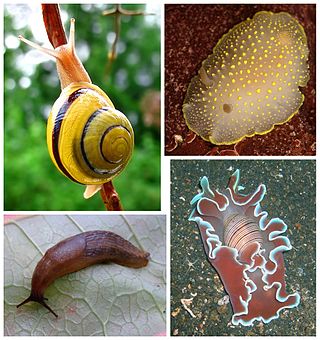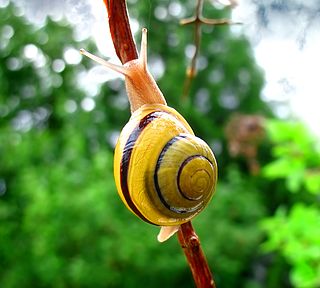
Sea slug is a common name for some marine invertebrates with varying levels of resemblance to terrestrial slugs. Most creatures known as sea slugs are gastropods, i.e. they are sea snails that, over evolutionary time, have either entirely lost their shells or have seemingly lost their shells due to having a significantly reduced or internal shell. The name "sea slug" is often applied to nudibranchs and a paraphyletic set of other marine gastropods without apparent shells.

Opisthobranchs is a now informal name for a large and diverse group of specialized complex gastropods which used to be united in the subclass Opisthobranchia. That taxon is no longer considered to represent a monophyletic grouping.

Heterobranchia, the heterobranchs, is a taxonomic clade of snails and slugs, which includes marine, aquatic and terrestrial gastropod mollusks.

The order Cephalaspidea, also known as the headshield slugs and bubble snails, is a major taxon of sea slugs and bubble snails, marine gastropod mollusks within the larger clade Euopisthobranchia. Bubble shells is another common name for these families of marine gastropods, some of which have thin bubble-like shells. This clade contains more than 600 species.

Pulmonata or pulmonates is an informal group of snails and slugs characterized by the ability to breathe air, by virtue of having a pallial lung instead of a gill, or gills. The group includes many land and freshwater families, and several marine families.

Sacoglossa are a superorder of small sea slugs and sea snails, marine gastropod mollusks that belong to the clade Heterobranchia known as sacoglossans. There are 284 valid species recognized within this superorder. Sacoglossans live by ingesting the cellular contents of algae, hence they are sometimes called "sap-sucking sea slugs". Some sacoglossans simply digest the fluid which they suck from the algae, but in some other species, the slugs sequester and use within their own tissues living chloroplasts from the algae they eat, a very unusual phenomenon known as kleptoplasty, for the "stolen" plastids. This earns them the title of the "solar-powered sea slugs", and makes them unique among metazoan organisms, for otherwise kleptoplasty is known only among other euthyneurans and single-celled protists.

Euthyneura is a taxonomic infraclass of snails and slugs, which includes species exclusively from marine, aquatic and terrestrial gastropod mollusks in the clade Heterobranchia.

Lower Heterobranchia, also known as the Allogastropoda, is a group of rather specialized, highly evolved sea slugs and sea snails, within the subclass Heterobranchia.

Nudipleura are a clade of sea snails and sea slugs, marine gastropod mollusks within the large clade Heterobranchia.

Acochlidiacea, common name acochlidians, are a taxonomic clade of very unusual sea snails and sea and freshwater slugs, aquatic gastropod mollusks within the large clade Heterobranchia. Acochlidia is a variant spelling.
Runcinoidea is a taxonomic superfamily or a clade Runcinaecea of sea slugs, marine gastropod mollusks in the order Runcinida
Strubellia paradoxa is a species of freshwater slug, a shell-less freshwater gastropod, an aquatic gastropod mollusk within the clade Acochlidiacea.
This overview lists proposed changes in the taxonomy of gastropods at the family level and above since 2005, when the taxonomy of the Gastropoda by Bouchet & Rocroi (2005) was published. In other words, these are recent updates in the way various groups of snails and slugs are classified.

Acochlidium fijiiensis is a species of freshwater gastropod, an aquatic gastropod mollusc within the family Acochlidiidae. Acochlidium fijiiensis has no shell.

Pseudunela is a genus of minute sea slugs, acochlidians, shell-less marine or temporary brackish or brackish gastropod mollusks in the clade Acochlidiacea.
Aiteng ater is a species of sea slug, a marine gastropod mollusc in the family Aitengidae. The specific name ater is from the Latin language and means black, in reference to the appearance of the slug on the mud.

Panpulmonata is a taxonomic clade of snails and slugs in the clade Heterobranchia within the clade Euthyneura.
Aiteng mysticus is a species of sea slug in the family Aitengidae, found around Hisamatsu, Miyako-jima, Okinawa, Japan. Morphologically it clearly belongs to the Aitengidae, but it shows differences to Aiteng ater at genus or species level. Its affinity to Aiteng ater is confirmed by comparison of the mitochondrial 16S rRNA sequences.

Pontohedyle is a genus of sea slugs, acochlidians, shell-less marine gastropod mollusks in the family Parhedylidae. Sea slugs in this genus are highly simplified and uniform.
Aiteng marefugitus is a species of fully terrestrial sea slug found only on the Ulong Island of Palau. The species name is derived from Latin, meaning "fled from the sea".











